Demonstrations and ‘hands-on’ events/activities
Demonstrations and 'hands-on' activities usually take place during the institution's usual opening hours or to invited target groups. Such events allow researchers and the public to interact directly and offer opportunities for unique, high-impact engagements.
Showcase-style events such as science fairs are:
- multi-format and may involve informal talks, hand-on activities and demonstrations;
- usually aimed at a family audience;
- an opportunity to engage a broad public, disseminating research widely across a diverse audience through various media;
- an opportunity to test public and community engagement with research (PCER) models and approaches while engaging a large public audience.
There may be many more possibilities than are listed below, as well as opportunities for overlap between different PCER categories depending on the nature of the project. There is also scope for cross-collection PCER activities that span more than one Oxford University Gardens, Libraries and Museums (GLAM) institution.
Please be aware that GLAM venues have full and busy programmes and it may not be possible to pick up activities that have already been fully developed or to deal with urgent requests. Ideally, activities should be co-created with GLAM from project conception and researchers should get in contact early so that we can work together to develop your ideas. Please note that while researchers may contact GLAM departments directly they are also encouraged to contact departmental/Divisional PCER facilitators for interim support/guidance.

GLAM PCER Toolkit | Getting started |
| Opportunities by category | Opportunities by institution | Case studies |
(Please note that opportunities are subject to change)
- The ability to have unique and individual interactions with the public which can have a higher impact than other types of event
- The use of material from the GLAM collections can create more memorable and meaningful engagements than at other types of event
- Showcase-type events can be an opportunity to test PCER models and approaches and gather quick responses from the public to research questions, current and prospective research
- Unlike events that require registration, demonstrations and hands-on activities that are drop-in and incorporated into the regular activities of the GLAM institutions can engage audiences without a prior interest in the research subject
- The interactive aspects of demonstration and hands-on events are ideal for engaging younger audiences
- These types of events often require high-levels of staffing
- Showcase-style events can be time and resource-intensive and need careful planning to ensure the balance between creating an enjoyable activity and delivering engagement messages
- Lead time for recruitment, training and induction for volunteers needs to be considered
List of considerations adapted from UCL Engagement's 'Putting on a public event'
The cost of demonstrations and ‘hands-on’ events/activities are likely to be variable but potentially fairly low. If they form part of an institution’s regular programme then a lot of the costs will already be covered in their regular activity but a demonstration/hands-on event will likely be more expensive if it is completely researcher-led. Costs may include:
- Staffing, e.g. Education Officer, technical services support – although may be given ‘in-kind’. See section on How much will the PCER activity cost? in the GLAM PCER Toolkit for further details
- Collaborator costs, e.g. speaker/performer fees, travel costs, refreshments) – although if these costs apply then the activity may be better categorised as a bespoke event
- Activity costs, e.g. craft/activity materials, additional printing
- Event costs, e.g. orientation signage, design of print materials
- Press release & additional marketing support (if required – may be covered via regular GLAM channels)
- Evaluation costs, e.g. Evaluation Officer time, survey costs (tablet or paper surveys)
- Film & photography
- AV and other equipment hire beyond that provided by the GLAM institution and/or the researcher
Please contact the relevant team to discuss costs as soon as possible.
Examples (in alphabetical order by GLAM institution)
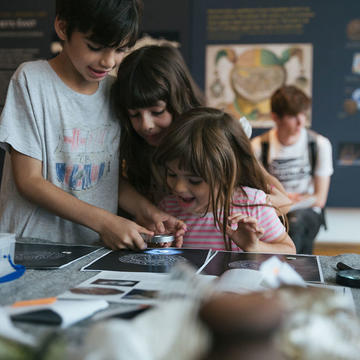
Ashmolean Museum
Family-friendly demonstrations and ‘hands-on’ activities may be inspired by the Museum’s permanent collections or special exhibitions.
Researchers could potentially run activities focusing on art and archaeology which could include hands-on demonstrations, object handling, handling coins or other creative research-based activities.
Approx. costs: Costs can be variable so contact the relevant team to discuss
Example: Big Family Weekend
Further examples/information: Families webpage
Ashmolean PCER projects are currently being updated. Examples and opportunities are subject to change.
Contact: PER Coordinator, Zoe Bampton (zoe.bampton@ashmus.ox.ac.uk)
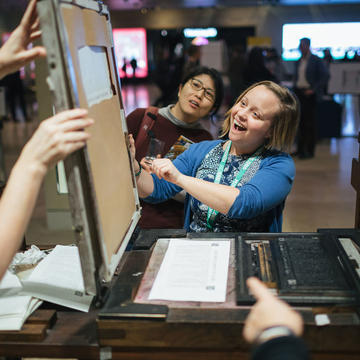
Bodleian Libraries
The Bodleian Library has a long-established programme of active learning through printing and other book arts. Family-friendly, drop-in or longer workshop sessions take place in the Weston Library or in the dedicated letterpress studio in the Old Bodleian Library, or by arrangement in other locations.
Research in any division may inspire an activity. The focus is on creativity and communication through word and image, providing a springboard for teaching or conveying the ideas behind the research and achieving tangible responses.
Example: Novel Impressions: Remaking Tristram Shandy
Further examples/information: Printing and book arts at the Bodleian Libraries webpage
Contact: Public Engagement team (publicengagement@bodleian.ox.ac.uk)
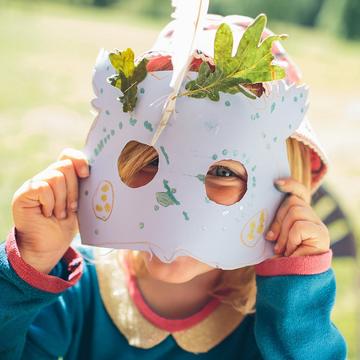
Research-themed activities for family-friendly events
Oxford Botanic Garden and Arboretum
Researchers can work with the education team to develop research-themed activities for family-friendly events and school visits. These could be in the form of popular ‘back-packs’ containing research kit, or specific activities delivering key stage elements of the National Curriculum.
Example: Kids' Explorer Backpacks at the Arboretum
Further examples/information: Families at the Arboretum webpage
Contact: Education team (education@obg.ox.ac.uk)
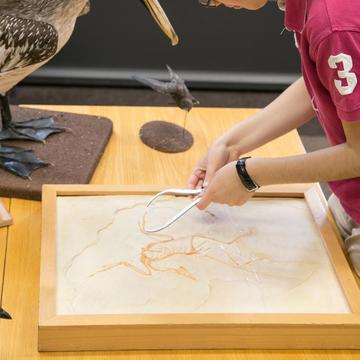
Oxford University Museum of Natural History
Natural History Investigators is a club for 14-16 year-olds interested in the natural world. Members have the opportunity to devise and carry out hands-on scientific investigations using specimens in the museum collections. They are also given special access to objects and experts in the field they are researching.
Early career researchers support the investigator group in paid mentor roles. This is an opportunity for training and engagement with focused support from the Museum’s public engagement team.
Further information: Young people webpage
Contact: Education team (sarah.lloyd@oum.ox.ac.uk)
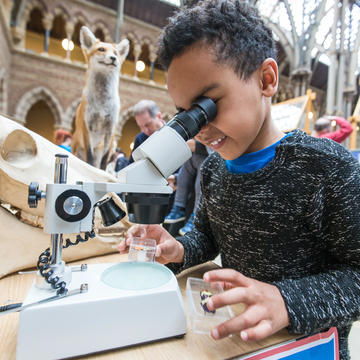
Oxford University Museum of Natural History
Science Saturdays take place during Oxford University term-time and are hands-on activities that introduce family visitors to some of the ideas, concepts, and processes that scientists use when working with the Museum’s collections.
Researchers and other scientists run the activities, which allow researchers to develop and practise their science communication skills in a supportive environment with assistance from experienced museum staff and volunteers.
Approx. costs: Limited costs - researchers should bring themselves and their research
Further information: Super Science Saturday video on YouTube
Contact: Education team (carly.smith-huggins@oum.ox.ac.uk)
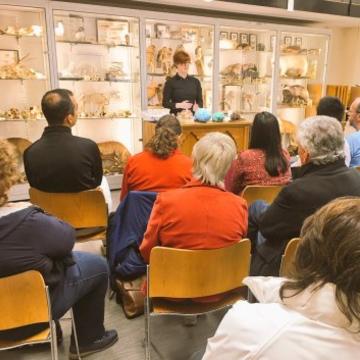
Oxford University Museum of Natural History
Science Shorts are 30 minute daytime talks, taking place monthly on Saturdays. The aim is to present research in a way that is accessible and inspiring. PowerPoint slides are not permitted but props, diagrams, and specimens are welcome!
Science Shorts allow postgraduate students and early career researchers to share their work with the public in the relaxed and informal setting of the Museum's Seminar Room.
Approx. costs: Limited costs - researchers should bring themselves and their research
Further information: Events webpage
Contact: Exhibitions team (natasha.smith@oum.ox.ac.uk)
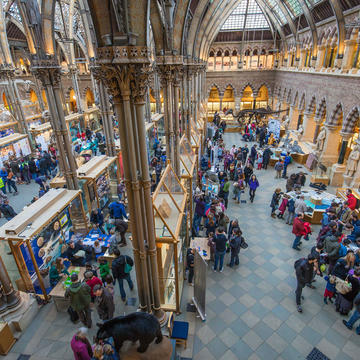
Oxford University Museum of Natural History
Super Science Saturdays are twice-yearly science fairs that attract very large (family) audiences. A range of stalls and activities aim to make science accessible, engaging, hands-on and fun, with up to 100 researchers presenting their research at each event.
Super Science Saturdays can be great places for early career researchers and those new to PCER for consultation and piloting. Researchers benefit from informal science communication training provided by the Museum for Super Science Saturday participants.
Approx. costs: Limited costs - researchers should bring themselves and their research
Further information: Case study on GLAM website
Contact: Education team (carly.smith-huggins@oum.ox.ac.uk)
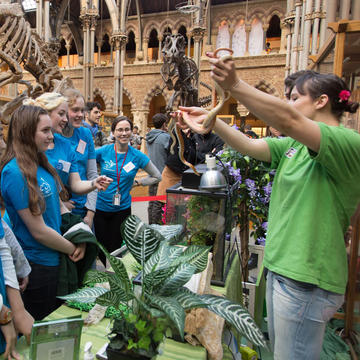
Oxford University Museum of Natural History
The Youth Forum is open to 16-19 year-olds who want to get more involved with activities in the museum. The group meets monthly and attendees have an interest in science with mixed levels of knowledge. The group helps to identify and explore issues that are of interest to young people, generate engagement ideas, and provide feedback on initiatives already in development.
Researchers are welcome to contribute to the sessions; proposals for sharing and consulting on research can be developed with the Museum team.
Approx. costs: Limited costs - researchers should bring themselves and their research
Further information: Young people webpage
Contact: Education team (jenny.hulmes@oum.ox.ac.uk)
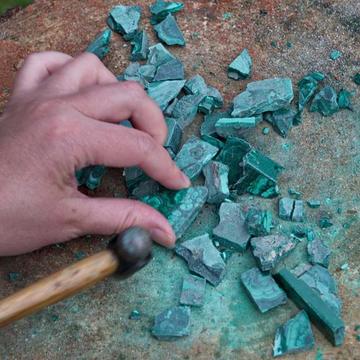
Hands-on activities based on research projects
Pitt Rivers Museum
Research-based exhibitions and displays can inspire a series of engaging interventions and pop-up exhibitions, and vice versa.
Researchers can potentially develop a hands-on activity based on an existing exhibition or display, or develop a one-off event with the Museum’s expert PCER team.
Approx. costs: Costs can be variable so contact the relevant team to discuss
Example: (Re)Made: From Mine to Metal
Further examples/information: Public engagement with research webpage
Contact the museum for more information (prm@prm.ox.ac.uk)

Pop-up in-gallery object talks
Pitt Rivers Museum
Monthly accessible object-based activity delivered in the galleries, which could be a short talk, mini-tour or something more interactive.
Researchers can gain skills and confidence in public engagement with research in an ideal entry-level platform for PCER.
Approx. costs: Costs will be low – researchers should bring themselves and their research
Further examples/information: Events webpage
Contact the museum for more information (prm@prm.ox.ac.uk)




